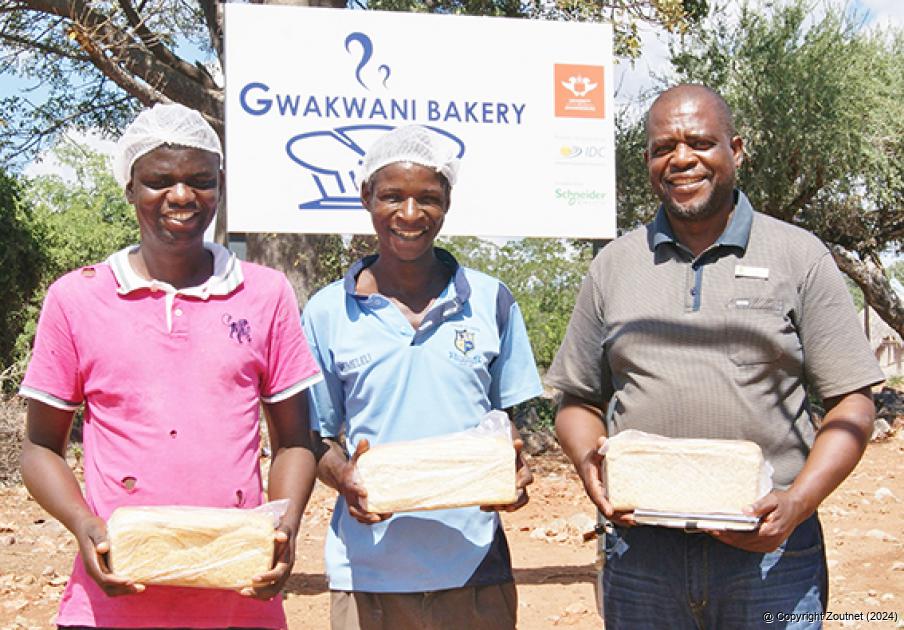

ADVERTISEMENT:

Messrs Godfrey Nefolovhodwe, Ndiimafhi Mukhada and the acting manager of local economic development of the Musina Municipality, Mr Itani Dzebu, photographed with some of the bread at the bakery.
Solarized bakery and cold storage facility for Gwakwani
A solar-powered community bakery, cold-storage facility and communal education centre are playing a major role in the improvement of life in the deep rural village of Gwakwani in Ward 10 of the Musina Municipality.
Before the village was integrated into Musina Municipality from the now-defunct Mutale, it was a village that was cut off from the rest of the country because it had no electricity or mobile phone network and only a very limited water supply.
The biggest challenge that faced the people of Gwakwani was the lack of any form of steady income, because most of the community members depended on social grants. The village has 27 households and a population of 100 people.
After detailed research by the University of Johannesburg in 2014, an idea was formed to construct a solarized bakery and a cold-storage facility in the village to address the shortage of fresh bread and to create employment for some the local community members. A communal structure with an area where community members have access to a television set, fridge and a children’s corner to help them develop educationally to help them learn was also erected.
This was spearheaded by the University of Johannesburg’s School of Electrical Engineering and various partners and sponsors, under the watchful eye of Corney Keefer, the project manager of the University of Johannesburg. Not only has the bakery project assisted Gwakwani Village in building an economy, it has also assisted the surrounding villages in producing a cheap staple feeding scheme and excellent nutrition on a daily basis.
The bakery manager, Mr Godfrey Nefolovhodwe, said that five community members were part of the project and they produced a total of 160 sold-out loaves of bread per day. “Before the project came into being, we were all unemployed, but we can at least put something on the table. Though the income is not much, we are grateful that we are working, and we are able to assist our community because there is no shop in the village where they can buy bread.”
He said the cold-storage facility helped them to store chicken feet and other types of affordable meat that they sold to the public. “We thank the University of Johannesburg, all the sponsors and partners, our project manager Corney Keefer, and our community members who have been supporting this project with the little income they spend here.”
Nefolovhodwe said although things were looking bright, they still had challenges that needed to be addressed. “We need further training on business management and advanced baking skills, but we don’t have money to enrol for those courses. We are also working without uniforms and protective clothing because we cannot afford to buy them. We will be grateful if we get assistance from Good Samaritans out there.”
The acting manager of local economic development at the Musina Municipality, Mr Itani Dzebu, thanked all the stakeholders who had played a role in the realisation of the project. “We are very happy that this village is slowly becoming self-dependent, although there is still much to be done to improve the standard of living here. This is a clear demonstration that stakeholders can also play a role in assisting government to improve people’s lives.”
Stakeholders or community members who would like to assist or know much about the project can contact Godfrey Nefolovhodwe at 084 470 0966.
News - Date: 09 June 2019

Recent Articles
-

My mother was killed, three-year-old tells aunt
19 April 2024 By Elmon Tshikhudo -

Woede ná R524 nog ‘n lewe eis
19 April 2024 By Andries van Zyl -

Community threatens with shutdown if roads are not fixed
18 April 2024 By Elmon Tshikhudo -

Vhembe swyg oor gesloer om lekke reg te maak
18 April 2024 By Andries van Zyl

